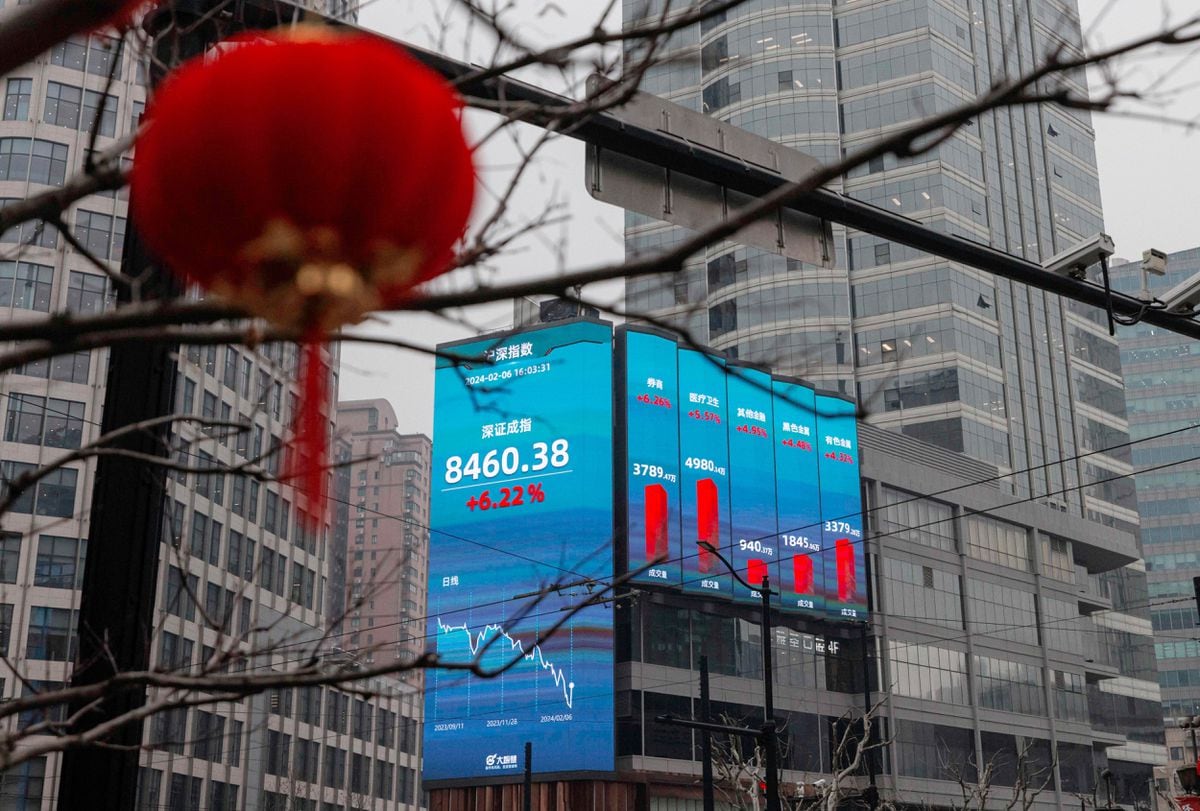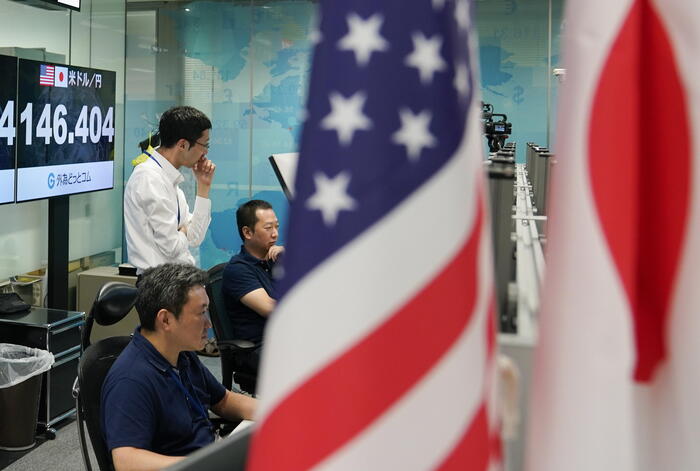Enlarge image
Photo: Jakub Porzycki / NurPhoto / IMAGO
If the value of a currency is a measure of how powerful the economy behind it is, then the US is not doing badly right now.
The dollar is stronger than it has been in decades.
The US currency last reached a comparable level against America's major trading partners in the fall of 1984, according to figures from the Bank for International Settlements (BIS).
At that time, Ronald Reagan was about to be re-elected as US President.
"It's morning again in America" was the slogan of a famous election commercial.
The nation is becoming "prouder, stronger, better".
The sun rose again: the miserable 1970s were over, that was the message – the Vietnam War, the Watergate scandal, inflation, civil unrest, all the unreasonable demands.
They set off towards the future and showed strength.
Under Reagan, taxes were cut and government spending expanded, especially the military budget.
The stationing of new medium-range missiles in Western Europe and the protests against them shaped an entire generation of Germans.
But the risk that the US government took with the intensified military pace paid off.
In Reagan's second term, the Soviet Union began to capitulate, realizing that it could not keep up: USSR frontman Mikhail Gorbachev got involved in disarmament negotiations.
A few years later the Eastern Bloc and the Soviet Union itself disintegrated. Globalization began and the USA was the only remaining superpower.
Is it conceivable that today's US President Joe Biden will be granted a similar success?
And if so, at what price?
The echo of recent history
Reagan's course had enormous economic repercussions.
The US began to take on massive foreign debt.
Until then, they had been the world's biggest creditor.
Under Reagan, they became the largest debtor.
The foreign trade balance (»current account balance«) turned into a deficit.
America was now dependent on capital imports from around the world to fund its spending - and that hasn't changed since.
Under Reagan, the US Federal Reserve worked against the expansionary fiscal policy and kept interest rates high to keep inflation under control.
The result was quite extreme: At the time of Reagan's re-election, the federal funds rate was over 9 percent and the yield on ten-year government bonds was 12 percent.
The consequences were serious.
In poorer countries of the Global South, high interest rates triggered a debt crisis.
Capital inflows from around the world fueled demand for the dollar, which subsequently rose to levels not seen since the 1960s, when the US currency was backed by the national gold hoard.
The expensive dollar endangered the solvency of many debtors all over the world, but also the competitiveness of entire industrial sectors in the USA, which were now undercut by cheaper importers.
De-industrialization took its course.
To mitigate the effects, Reagan sent his Deputy Trade Representative Robert Lighthizer, among other things, to negotiate "voluntary export restrictions" for the auto industry, for example, especially with Japan.
A paradoxical policy that preached free trade on the one hand and targeted protectionism on the other.
Reagan-era veteran Lighthizer was later appointed Donald Trump's trade representative, but the strategy didn't work by then.
Of course, history doesn't repeat itself.
But sometimes you can hear their echo very clearly.
Is Biden the Reagan of the 21st Century?
On Wednesday
, the US Federal Reserve decides on its further course.
And it looks like it is sticking to its policy of raising interest rates rapidly and massively.
There hasn't been such a rapid increase since Reagan's time.
As a result, the dollar should continue to appreciate, especially since other countries' central banks have already indicated that they may want to slow down in the future, including the European Central Bank (ECB) and the Bank of Canada.
more on the subject
Strong US Dollar: The Economic Weapon of Mass DestructionBy Ines Zöttl, Washington
Anger at Scholz's European and China policy: "Such an arrogant sentence..."
War in Ukraine: Thanks, Joe! A column by Henrik Müller
A debt crisis in emerging and developing countries has long been brewing.
In particular, economies that borrowed in dollars are now facing payment problems.
As far as the course of the US government is concerned, the parallels to the Reagan era are unmistakable.
Joe Biden may not be a tax-cutter, but rather he started with a left-liberal agenda by US standards.
But there are several similarities to the Reagan era: under Biden, government spending is increasing rapidly, as is the capital imported to finance it.
On the one hand, Biden's goals are to pacify the divided American society after the Trump era.
On the other hand, he wants to assert America's global military leadership, in doing so emulating Reagan.
And that costs.
Containment on all fronts
"America is back" was Biden's message to the world shortly after he took office.
Without his leadership, the Russian war of aggression against Ukraine would have been different.
It is possible that parts of the NATO area would have been overrun long ago – a sign of inadequacy for us Europeans, by the way.
The USA contributes by far the largest part of the Ukraine aid, as determined by the Kiel Institute for the World Economy.
At the same time, the Biden administration in Asia is opposing Chinese expansionism.
Until recently, explicit promises of assistance to Taiwan, a democratic state that Xi Jinping's China would like to recognize, were not part of America's repertoire.
The tone of reserved strategic ambivalence was cultivated.
Biden changed that.
He is second to none in his determination to face the opposing bloc.
A verdict in America's favour
Using the exchange rate as a measure of real-world acceptance of policy stance, financial markets appear to have faith in Biden's stance to succeed, much like Reagan's.
The current account deficit will remain horrendous, the International Monetary Fund (IMF) predicts.
But the rest of the world seems willing and able to accept and participate in this capital import for the benefit of Western power.
In the 2000s, economists like Maurice Obstfeld and Kenneth Rogoff, both of whom would later become IMF chief economists, repeatedly warned that America's deficit policies were unsustainable.
So far, however, there has been no sign of a loss of trust.
An impressive verdict in favor of America.
Instead of the dollar crashing, we are seeing the opposite: the US currency is soaring.
China's leadership under top ruler Xi Jinping, on the other hand, is being punished: After last week's "People's Congress", which cemented his authoritarian agenda, not only did the off-shore value of the yuan plummet, but also the stock market listings of Chinese companies listed abroad.
The external value of the euro, the second most important international currency, continues to fall.
Burdened by the direct effects of the Ukraine war and the weak will of the 27 EU states to act together, also on the part of the federal government, the common currency was quoted at its lowest point in 20 years at the end of the week.
The pound sterling, plagued by the political turmoil in post-Brexit Britain, has been weaker against the dollar since the mid-1980s, despite a new government.
Why the dollar is still the world currency
advertisement
Henrik Mueller
Short-cut politics: How permanent outrage destroys our democracy
Publisher: Piper
Number of pages: 256
Publisher: Piper
Number of pages: 256
Buy for €17.99
price inquiry time
10/30/2022 4:52 p.m
No guarantee
Order from Amazon
Order from Thalia
Order from Weltbild
Product reviews are purely editorial and independent.
Via the so-called affiliate links above, we usually receive a commission from the retailer when you make a purchase.
More information here
The external value of a currency is not only the result of different international interest rates and inflation rates.
It is also a measure of the credibility of the state institutions behind it.
And in that respect, the US still ranks respectably compared to other powers.
That is why the dollar is still the leading world currency.
But times are troubled.
And it is by no means certain that the USA and its Western-minded partners (EU, Japan, Great Britain, South Korea, Australia and others) will win the systemic conflict with the Far East bloc that is forming around China and Russia.
The currency markets will react sensitively to any changes in the balance of power.
The most important economic dates of the coming week
Expand areaMonday
London –
Straight talk
– British Treasury Secretary Jeremy Hunt wants to present the medium-term financial plan.
The previous short-term government under Premier Truss and Chancellor of the Exchequer Kwateng caused a tremor on the financial markets.
Luxembourg –
Euro's weakness
– The EU statistics agency Eurostat will publish a preliminary estimate of inflation in the euro area in October.
Earnings Season I
- Results from NXP Semiconductors, Marriott.
ExpandareaTuesday
Reporting Season II
– Fresenius, BP, Eli Lilly, Pfizer, Uber, Mondelez, AMD financial results.
ExpandareaWednesday
Washington –
Hike, Hiker, Hikelander –
The US Federal Reserve decides on its future course in monetary policy.
Nuremberg –
Jobs?
– The Federal Employment Agency presents new figures on the situation on the German labor market.
Frankfurt -
It remains difficult
- The mechanical engineering association VDMA publishes new figures for incoming orders.
Reporting Season III
– Business figures from AP Moller-Maersk, Ferrari, AXA, GlaxoSmithKline, Qualcomm, Vestas, Aston Martin, Teamviewer, Ebay.
Expand areaThursday
Luxembourg -
#Jobs
- The EU statistical authority Eurostat publishes key figures on unemployment.
Reporting season IV
– Business figures from BMW, Stellantis, Uniper, Hannover Re, Euronext, Klöckner & Co, Heidelberg Materials, Conoco Phillips, BT Group, Rolls-Royce, Scout24, Enel, PayPal, Starbucks, Amgen, SGL Carbon, Legrand, Adecco, ING, Zalando, BNP Paribas, Hugo Boss, Sainsbury.
ExpandareaFriday
Washington –
Men without work
– New data on the US unemployment rate
Reporting Season V –
business figures from Vonovia, Bertelsmann, RTL.
Gea, Telefonica, Societe Generale.








